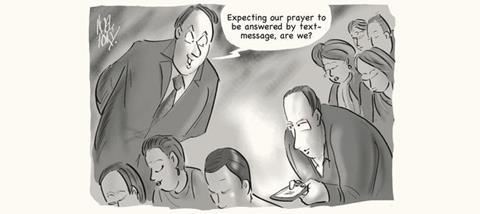
I usually pause before performing this techno-task, ensuring that my precious data is safe by backing it up. But that day, I was working on about ten projects at once. Without thinking, I clicked. Mistake.
Two hours later, I was left holding a laptop that was damaged beyond repair, my data gone. Book manuscripts, accounts and emails had been vaporised. I spent the next three days with a ‘genius’ in a computer store who valiantly tried to help me.
My woes continued. A few days later I popped into a loo in the motorway services, and having washed my hands, I stood for 30 seconds with my hands outstretched in a worshipful position, waiting for the hot air to dry them. And then the truth dawned. I was actually waiting in vain for a vending machine to dry my hands. Passers-by were bemused by the chap who seemed lost in adoration before a silver box that dispenses contraceptives and breath mints. Awkward.
Both of these episodes happened because I was multitasking. Texting while I was walking into the bathroom, I paused to answer the phone, and then got an email. Focused I was not.
Many of us are unfocused and distracted. Half of those who use tablets visit social networking sites while watching television. Twothirds check emails in front of the box. Armed with a smartphone that also serves as a calculator, stock market scoreboard, game console, appointment calendar, voice recorder, guitar tuner, body mass indexer and weather forecaster, we’re constantly multitasking.
But experts tell us that our brains are not wired to multitask well. When we think we’re multitasking, we’re actually just switching from one task to another very rapidly, and so reducing our productivity by up to 40%. And making decisions with thinking that is fragmented or distracted can lead to disaster – or embarrassment, as demonstrated by my time of worship with the vending machine.
Two millennia before multitasking was questioned by academics, Jesus gently scolded a friend of his, Martha, for her bustling obsession with doing too many things at once. Bristling with resentment because her sister, Mary, was enjoying sitting at the feet of Jesus and learning – usually a role only taken by men – she was likely bashing pots and pans around in the kitchen to highlight her frustration. Rather than rebuking Mary, Jesus commended her singlemindedness.
So at the beginning of this new year, let’s decide to be fully present in the moment. Technology ‘sabbaths’ of a few hours will enable us to focus, reflect, and just think. We could also avoid screens of all types for the first and last hour of the day. We’ll be more effective in our waking hours, and sleep better at night.
And let’s intentionally give our diaries over to God. Scripture warns those who follow Jesus about the creeping disease of wandering away from him. ‘Look here, you who say, “Today or tomorrow we are going to a certain town and will stay there a year. We will do business there and make a profit.” How do you know what your life will be like tomorrow? Your life is like the morning fog – it’s here a little while, then it’s gone. What you ought to say is, “If the Lord wants us to, we will live and do this or that” (James 4:13-15, NLT).
We’ve given our lives to Jesus. Let’s renew our allegiance to him this year, and not succumb to the temptation to quietly, unthinkingly, take those lives back.



























